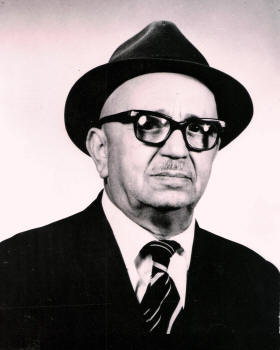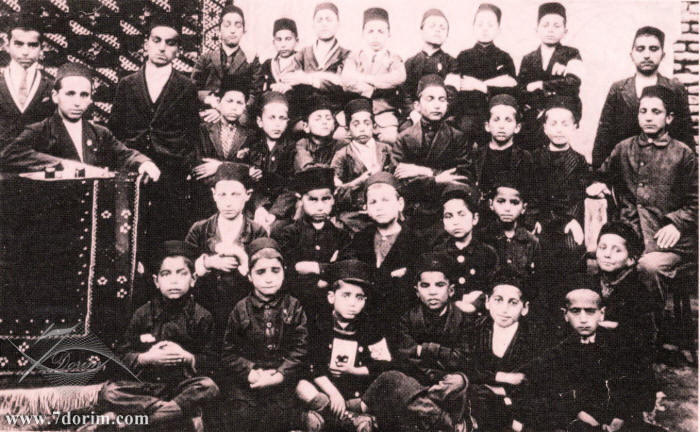
Yosef Deylamani
Yosef Deylamani’s life is a powerful story of dedication and impact on a Jewish community in need. He educated and mentored three generations of Jews in Mashhad and Tehran, ensuring the community’s legacy of scholarship endured. Despite facing financial hardships, Yosef served tirelessly and selflessly, viewing his commitment to teaching as a sacred duty, never expecting anything in return. This is a short biography of a member of our community who deserves much greater recognition.
Birth and Early Life
Family
Yosef Deylamani was born in 1901 in a devout Jewish family in Mashhad. Having witnessed the bitter Allahdad tragedy in Mashhad, Yosef’s father, Eshagh Deylamani was determined to preserve the Jewish beliefs and customs, especially in his own family, just like other Anusim Jews (Jews who were coerced to abandon Judaism against their will, typically while forcibly converted to another religion).
Education
Although educational opportunities were scarce or non-existent, especially for Jews, Yosef began his primary education at the age of seven at Kamaliyeh School, and later completed two years of Persian and Arabic studies at Adab School in Mashhad. In his free time, during summer holidays for instance, Yosef would study Hebrew and Jewish law at home under the guidance of his father and Mashhadi rabbis.
Mastery of religious texts
By adolescence, Yosef had already mastered the interpretation of the Torah, Mishnah, and Gemara. He then continued his advanced religious studies under Rabbi Abraham Yazdi, where he also learned the practice of Shechita (ritual slaughter) and other related religious teachings.
Marriage
In 1919, at the age of eighteen, Yosef married Esther from the Hakimian family in Marv. The couple had four sons and two daughters.
Yosef’s Contributions
Yosef’s school
Yosef’s cultural work began in his youth with teaching Hebrew to Jewish Mashhadi children. His growing success led to increased demand, prompting him to establish a school in 1945 with the support of community members, including Noorallah Dardres.
Yosef gradually expanded his school to include five Hebrew classes (Talmud Torah) and four Persian classes. He aimed to offer a full primary education to Jewish children, but the Ministry of Education limited him to teaching only up to the fourth grade due to certain restrictions.
Afternoon education
Besides teaching at his school, Yosef held evening classes during his free hours and summers, teaching the Tanakh (Torah, Nevi’im, Ketuvim), tefillin binding, and Shechita, focusing especially on communal slaughter techniques. His commitment to educating the Mashhadi Jewish community was profound, often volunteering his time.
In his book “The Development of Culture and Education”, Raphael Patai describes Yosef’s classes, “During the 1930s, Mollah Yosef Deylamani was the most important member of Mashhad Jewish classes, in which he was supported by his brother, Musa. Talmud Torah classes were held in two rooms on the second floor of one of the houses in the Eidgah neighborhood. Another room was dedicated to students who had completed elementary school but wanted to continue their education. Classes ran from 8 AM to 4 PM, with a one-hour lunch break between 12 and 1 PM.
Mollah’s Dedication to Jewish Education
The passion to serve and teach the Jewish community of Mashhad was rooted so deep into Mollah’s soul that he taught the children of the community without having any expectations in return. He mostly taught for free, always believing that it is his duty.
Financial State
The Mashhadi Committee paid Yosef a modest monthly stipend of twenty tomans for his efforts, but this amount could not cover his living expenses. To help Yosef, a few textile merchants decided to partner with him in the fabric trade to support his financial needs. With all the effort and attempts Yosef made, however, he was unsuccessful in the textile business. After six months of trying, Yosef returned to teaching full-time.
Migration to Tehran
Teaching in synagogues
Following the Passover events in 1946, a large number of Jews began leaving Mashhad. This trend accelerated after Israel’s independence in 1948, further reducing the number of Talmud Torah students. In the early 1950s, Yosef was compelled to migrate to Tehran. He initially taught at the Azizi Khan synagogue, the only synagogue for Mashhadi Jews at the time, and later expanded his teaching to the Abdollahzadeh and Levian synagogues, adding Jewish jurisprudence and religious law to his teachings.
Ozar HaTorah
Mollah Deylamani joined the Otzar HaTorah cultural institute, teaching Hebrew in numerous Jewish schools, including the Kourosh schools for boys and girls and the Roohishad School (in Darvazeh Dowlat).
In appreciation of Mullah Yosef Deylamani’s valuable services over fifty years, financial assistance was provided for the purchase of a home for him in Tehran. This support was made possible through the efforts of Musa Nasrollahian, a community leader at the time, his eldest son Samad Agha Deylamani, and other benevolent individuals from Mashhad.
Teaching Style and Legacy
Yosef was known for his kind and respectful teaching style. He treated his students like his own children, avoiding common punitive measures of the time, such as beating, which was prevalent back then. Over fifty years, he dedicated himself to teaching Hebrew, promoting the Torah, Mishnah, and nurturing three generations of Iranian Jewish children, especially the children and the young of the community.
Death
On the 6th of Sivan, the first day of Shavuot, in 1985, Yosef Deylamani passed away in Tehran at the age of 84. Many of the Mashhadi Khazanims were his students once. They believe that they owe their knowledge to this noble, righteous, and devoted scholar.



 فارسی
فارسی